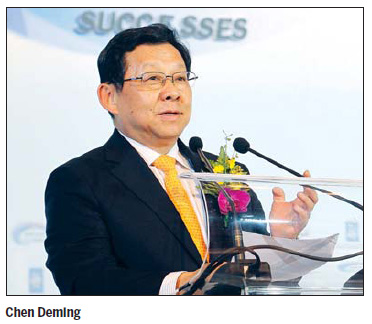Historic changes, challenges ahead
Updated: 2011-12-09 08:40
(China Daily)
|
|||||||||||

Minister of commerce: Progress and global benefits since China's accession to the WTO
China's accession to the World Trade Organization (WTO) was an important milestone in its reform and opening up, China's Minister of Commerce Chen Deming said in a recent article to commemorate the 10th anniversary of the event.
After 15 years of negotiation, China became a WTO member on December 11, 2001.
Chen said China's exports increased almost five-fold while imports grew 4.7 times over the 10 years.
Manufacturing industries performed even better, and technology-intensive and high value-added products such as automobiles, ships and locomotives have gradually become major exports for the nation.
China has developed into the world's No 1 investment destination over the past decade, while its outbound investment increased by about 50 percent annually from 2002 to 2010.
Chen noted that further opening of the domestic market to meet its commitments to the WTO has put China on track to a market economy with diverse market players.
The minister cited State-owned enterprises as an example, noting they have carried forward reforms toward building a modern corporate system featuring multiple owners and modern governance.
Private businesses and foreign-funded enterprises are playing a more important role in the national economy.
Chinese companies have also become more competitive in international markets. By 2010, 54 Chinese enterprises were listed among Fortune 500 companies, compared with the 12 in 2001.
Chen said China's commitments to the WTO have also been honored through reduction of tariffs.
The average tariff rates for imported products have fallen from 15.3 percent in 2001 to 9.8 percent today.
He added that China is continuing to promote a transparent and fair environment for trade and investment.
The nation's legislators have reviewed and revised laws and regulations according to the requirements of the WTO, and various levels of government are improving information disclosure systems and administrative approval procedures.
Open markets have been promoted, with more than 100 sectors in the service trade further opened to foreign businesses.
As a member of the WTO, China is playing an increasingly important role in bilateral and multilateral collaboration, the trade minister said.
Over the past 10 years, China has been active in trade talks such as the Doha Development Round.
The country has also signed free trade agreements with a number of countries.
China is now the largest trade partner of Japan, South Korea, Southeast Asia, Australia and South Africa, and the second-largest partner of the European Union and the third-largest with the United States.
But despite the achievements, Chen noticed the great challenges ahead for both China and the world - the global economic downturn that started in 2008, the rise of trade and investment protectionism and other global concerns such as the shortage of resources and energy, climate change and grain supply security.
In China, the problems that concern Chen include weakening competitiveness due to rising labor costs, growing pressures for employment, the lack of innovation in business circles, and the shortage of land, minerals and energy.
The overall environment led the minister to propose research into new "opening-up strategies".
His suggestions include further market openness, further reforms in tariffs and a better balance between exports and imports.
He said the country should steadily open its finance, healthcare, education and tourism sectors to foreign businesses.
While attracting foreign investment, the government should make new efforts to help domestic companies go global.
"And finally, China should play a more important role in the global trade system and promote the expansion of free trade areas to ensure the long-term interests of the nation and the world," Chen said.








